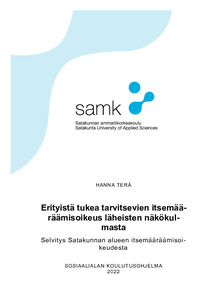Erityistä tukea tarvitsevien itsemääräämisoikeus läheisten näkökulmasta: selvitys Satakunnan alueen itsemääräämisoikeudesta
Terä, Hanna (2022)
Terä, Hanna
2022
All rights reserved. This publication is copyrighted. You may download, display and print it for Your own personal use. Commercial use is prohibited.
Julkaisun pysyvä osoite on
https://urn.fi/URN:NBN:fi:amk-2022101021028
https://urn.fi/URN:NBN:fi:amk-2022101021028
Tiivistelmä
Tämä opinnäytetyö käsittelee erityistä tukea tarvitsevien itsemääräämisoikeutta heidän läheistensä näkökulmasta. Tutkimuksen toimeksiantajana toimi Kehitysvammaisten Palvelusäätiö (KVPS) ja tutkimus tehtiin yhteistyössä Satasairaalan kanssa. Tutkimuksen tarkoituksena oli selvittää erityistä tukea tarvitsevien läheisten tietoa ja kokemuksia tukea tarvitsevien itsemääräämisoikeudesta sekä läheisen tuen tarvetta itsemääräämisoikeuden vahvistamisessa. Tarkempana tutkimuskohteena olivat Satasairaalan kehitysvammapalveluiden asiakkaiden läheiset. Tutkimus toteutettiin sähköisellä kyselylomakkeella Google Forms -ohjelmaa käyttäen. Kyselyn kysymykset muodostettiin Likert -asteikkoa, kyllä/ei- kysymyksiä sekä avoimia kysymyksiä käyttäen. Vastauksia tuli yhteensä 15 kpl. Aineistoa saatiin laajasti ympäri Satakuntaa.
Aineistosta saatujen tulosten perusteella erityistä tukea tarvitsevien läheiset arvioivat tietävänsä melko paljon itsemääräämisoikeudesta. Itsemääräämisoikeus kuvattiin oikeutena päättää, määrätä sekä tehdä itseään koskevia päätöksiä. Itsemääräämisoikeuteen liitettiin tukea tarvitsevan kyky tehdä ja ymmärtää päätöksiä. Läheisten kokemukset itsemääräämisoikeudesta erityishuollon palveluissa ja arjessa olivat myönteisiä. Lisäksi kokemuksissa nousi esille rajoitustoimenpiteet sekä kommunikoinnin haasteet itsemääräämisoikeuden toteutumisessa. Jos läheinen arvioi kyselyssä tietomääränsä itsemääräämisoikeudesta vähäiseksi, kokemukset eivät olleet myönteisiä. Läheiset kokivat, että kommunikaatio ja tukea tarvitsevan tunteminen on tärkeää itsemääräämisoikeuden toteutumisessa, ja se myös haastaa sitä. Läheisten mukaan tukea tarvitseva pystyy parhaiten vaikuttamaan arjessaan ruokailuun ja pukeutumiseen. Vähiten pystyy vaikuttamaan asumiseen ja rahankäyttöön. Läheiset myös tietävät, miten tukevat itsemääräämisoikeutta. Läheiset eivät kuitenkaan osaa sanoa, haluaisivatko apua itsemääräämisoikeuden tukemisessa. Tukemisen rooli koettiin tärkeänä ja vastuullisena. This thesis deals with the right to self-determination of those who need special support from the perspective of their close ones. The client for the study was the Service Foundation for People with an Intellectual Disability (KVPS) and the study was conducted in collaboration with the Satasairaala Hospital. The purpose of the study was to find out the knowledge and experiences of close ones about the right to self-determination of those who need support. In addition, the purpose was to research the close ones’ need for support to strengthening the right to self-determination of the ones in need of support. The subject of the study were the close ones of the clients of intellectual disability services. The research was carried out with an electronic questionnaire using the Google Forms program. The survey questions were formed using a Likert scale, yes/no questions, and open questions. A total of 15 responses were received. The research material was obtained widely from all over Satakunta.
Based on the results, the close ones estimated that they know relatively well about the right to self-determination. The right to self-determination was described as the right to decide, order, and make decisions concerning oneself. The right to self-determination was associated with the ability to make and understand decisions. The experiences of close ones regarding the right to self-determination in special care services and in everyday life were positive. In addition, close ones highlighted the experiences of restrictive measures and communication challenges. If a close one rated their amount of knowledge of the right to self-determination as low in the survey, the experiences were negative. Close ones experienced that communication and knowing the one who needs special support is important in the realization of self-determination. It also challenges self-determination. According to the study, the person who needs support had the most influence on what to eat or what clothes to wear. In contrast, the person had the least influence over where to live or how to spend money. The close ones know how to support the right to self-determination. However, the close ones reported to not to need help in supporting the right to self-determination. The role of support was perceived as important and responsible.
Aineistosta saatujen tulosten perusteella erityistä tukea tarvitsevien läheiset arvioivat tietävänsä melko paljon itsemääräämisoikeudesta. Itsemääräämisoikeus kuvattiin oikeutena päättää, määrätä sekä tehdä itseään koskevia päätöksiä. Itsemääräämisoikeuteen liitettiin tukea tarvitsevan kyky tehdä ja ymmärtää päätöksiä. Läheisten kokemukset itsemääräämisoikeudesta erityishuollon palveluissa ja arjessa olivat myönteisiä. Lisäksi kokemuksissa nousi esille rajoitustoimenpiteet sekä kommunikoinnin haasteet itsemääräämisoikeuden toteutumisessa. Jos läheinen arvioi kyselyssä tietomääränsä itsemääräämisoikeudesta vähäiseksi, kokemukset eivät olleet myönteisiä. Läheiset kokivat, että kommunikaatio ja tukea tarvitsevan tunteminen on tärkeää itsemääräämisoikeuden toteutumisessa, ja se myös haastaa sitä. Läheisten mukaan tukea tarvitseva pystyy parhaiten vaikuttamaan arjessaan ruokailuun ja pukeutumiseen. Vähiten pystyy vaikuttamaan asumiseen ja rahankäyttöön. Läheiset myös tietävät, miten tukevat itsemääräämisoikeutta. Läheiset eivät kuitenkaan osaa sanoa, haluaisivatko apua itsemääräämisoikeuden tukemisessa. Tukemisen rooli koettiin tärkeänä ja vastuullisena.
Based on the results, the close ones estimated that they know relatively well about the right to self-determination. The right to self-determination was described as the right to decide, order, and make decisions concerning oneself. The right to self-determination was associated with the ability to make and understand decisions. The experiences of close ones regarding the right to self-determination in special care services and in everyday life were positive. In addition, close ones highlighted the experiences of restrictive measures and communication challenges. If a close one rated their amount of knowledge of the right to self-determination as low in the survey, the experiences were negative. Close ones experienced that communication and knowing the one who needs special support is important in the realization of self-determination. It also challenges self-determination. According to the study, the person who needs support had the most influence on what to eat or what clothes to wear. In contrast, the person had the least influence over where to live or how to spend money. The close ones know how to support the right to self-determination. However, the close ones reported to not to need help in supporting the right to self-determination. The role of support was perceived as important and responsible.
